Search engine optimization (aka SEO) is undoubtedly top of mind for every SaaS company’s digital marketing strategy in 2024. Yet, within the constantly evolving landscape of SEO, it’s easy to get overwhelmed and paralyzed by all the potential processes you can implement. Additionally, the internet is getting more crowded–largely fueled by the AI content craze–so how can you meaningfully stand out from the noise and competition within your niche?
Topical authority.
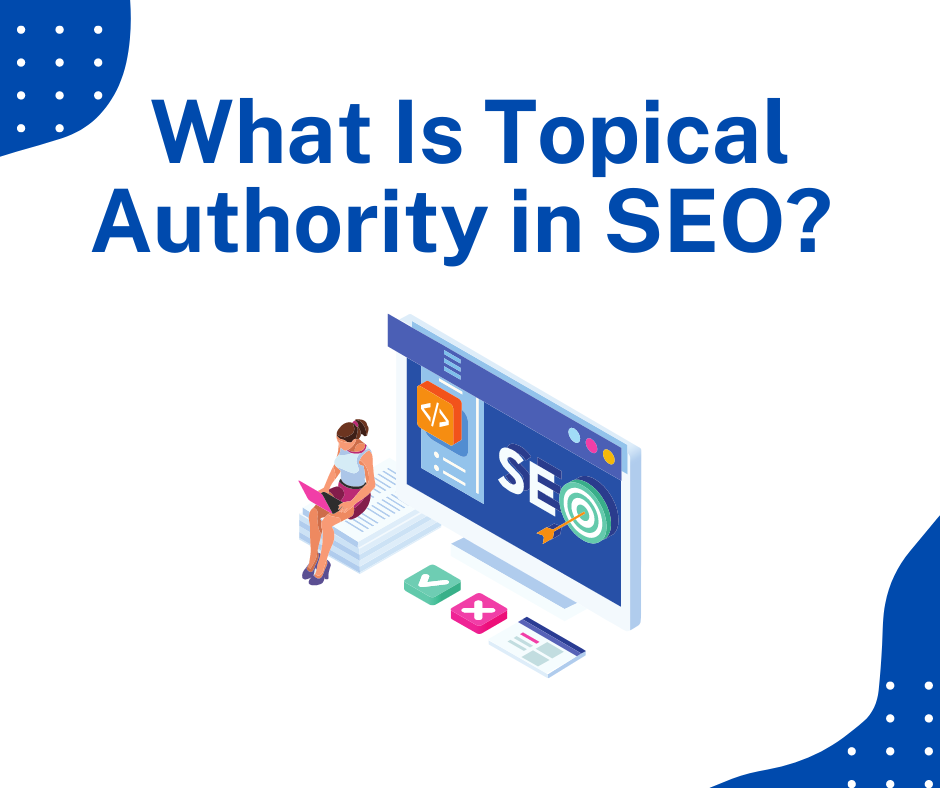
Understanding Topical Authority
In relation to SEO, topical authority measures how well a website covers a certain topic with its content. It is a strategy that focuses on becoming the go-to resource for a specific subject area so that the website earns the trust of both search engines (like Google) and users. Unlike traditional SEO, which might just focus on individual keywords, topical authority emphasizes the importance of covering a topic in depth across multiple content pieces to
create an intricate web of info that search engines can’t help but notice (and reward).
Importance of Topical Authority in SaaS SEO
While topical authority is beneficial for any website, SaaS (Software as a Service) sites stand to benefit more than others. This is largely due to SaaS companies’ unique nature and target audiences. A SaaS company targets a niche that’s looking for solutions to specific problems and requires content that attracts visitors and educates them about the software.
So, topical authority helps a SaaS business become a recognized resource for its niche. In a digital ecosystem where every brand is vying for attention, establishing topical authority helps you stand out when potential customers are organically searching for what your product does.
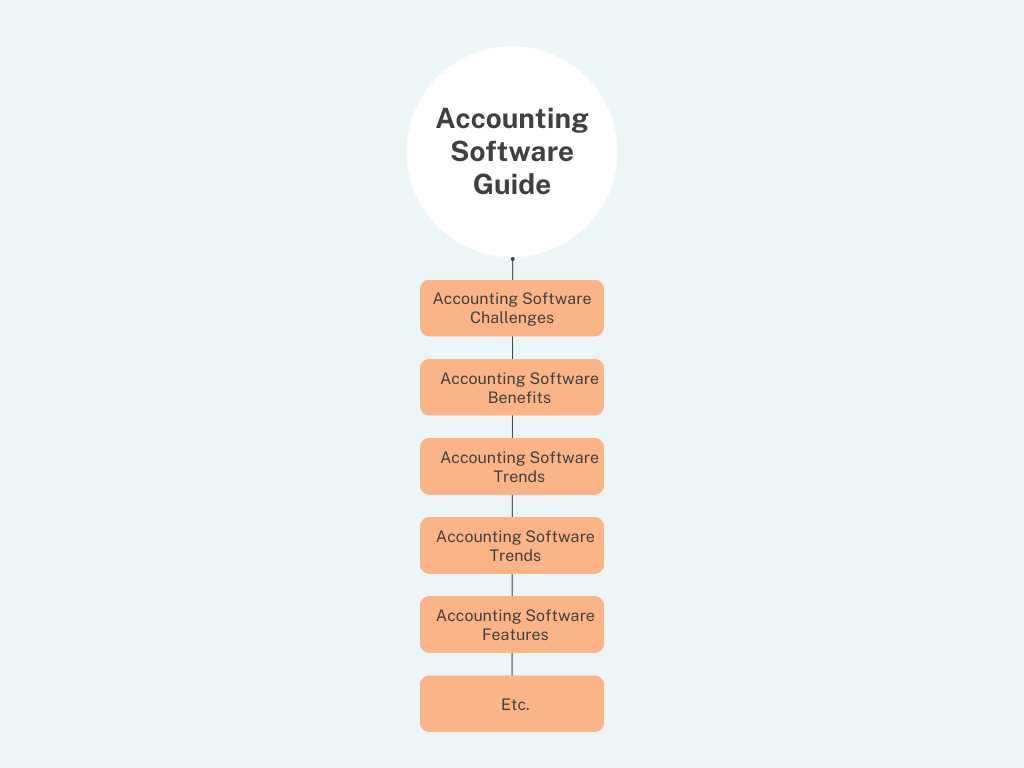
How Topical Authority Influences Google’s Rankings
Google’s algorithms have gotten quite sophisticated throughout the years. Spammy, deceptive tactics that would have worked a decade ago (such as excessively stuffing keywords in content or buying backlinks) no longer get the job done today.
Now, Google has evolved to provide users with relevant, high-quality content. In fact, 3 of Google’s major algorithm updates in the last year and a half have revolved around prioritizing “helpful content.” One significant factor in evaluating whether content is helpful is evaluating a page and website’s experience, expertise, authoritativeness, and trustworthiness (known as E-E-A-T). This is where topical authority comes into play.
Quality Rater Benefit
As Google continuously crawls and sifts through the internet’s endless content, it simultaneously analyzes what’s helpful and relevant for users. By thoroughly covering a topic across multiple pieces of content, you can demonstrate to Google that your page (and site) isn’t just a one-hit wonder for a keyword but rather a comprehensive resource for that particular topic.
In short, topical authority inherently increases your E-E-A-T ranking factors. Creating several pieces of content around one topic can show that the website/author:
- Has personal experience and direct knowledge of the topic,
- Is more likely to be an expert in that specific field,
- Is the go-to resource (aka an authority) for the topic,
- And offers trustworthy information that helps the reader.
Link Structure Benefit
While the above factors help from a subjective quality rating level, topical authority also matters from an objective, technical level. A significant benefit of topical authority lies in the link structure and hierarchy that comes with it.
Two of the most high-value SEO practices include internal linking and link building. By creating different pages that are topically related (for instance, having blogs that explore accounting software, its benefits, trends, etc.) you create the opportunity to naturally internally link all of those pages together. And according to most SEO experts (like the folks at First Page Sage), internal links are one of the top 3 on-page optimizations websites should prioritize. So, topical authority cultivates low-hanging fruit for better, stronger internal links.
When you dive deep into a topic, you also create the opportunity for external websites to link to your high-quality, engaging content. In the SEO world, this is called a backlink and it’s generally regarded as a top 3 Google algorithm ranking factor. So, establishing topical authority increases your chances of securing backlinks.
The cherry on top is that some of the value from a backlink even gets passed along to the internally linked pages. For example, let’s say your “Accounting Software Guide” blog internally links to another one of your blogs titled “Accounting Software Challenges.” If you’re able to secure a backlink from Forbes to your “Guide” blog, not only does the “Guide” blog get some link power but so does the “Challenges” blog. This principle applies to any SaaS category, from auto repair shop software to web collaboration tools. In short, all of related pages benefit from one another.
How Topical Authority Influences Potential Customers’ Choices
When people are on the hunt for business solutions, they’re not just looking for quick answers; they’re looking for trusted sources that can guide them through all of their questions and concerns. Establishing topical authority helps position your SaaS company as that trusted guide.
Users encounter your content repeatedly while searching for information, so their trust in your brand grows. This trust is crucial in the SaaS industry where deciding to subscribe to a software service often involves significant consideration and comparison. By consistently providing valuable, authoritative content, you cast a wider net to reach more people and influence potential customers’ choices, steering them toward your solutions and away from competitors.
Salesforce Case Study
For instance, if your business was looking for CRM software and you took your investigation to Google, maybe you’d search for:
- What is CRM
- Benefits of CRM
- CRM for beginners
- CRM history
- Or CRM business examples
If you performed any of those Google searches, guess what the top result is for each one? Salesforce.
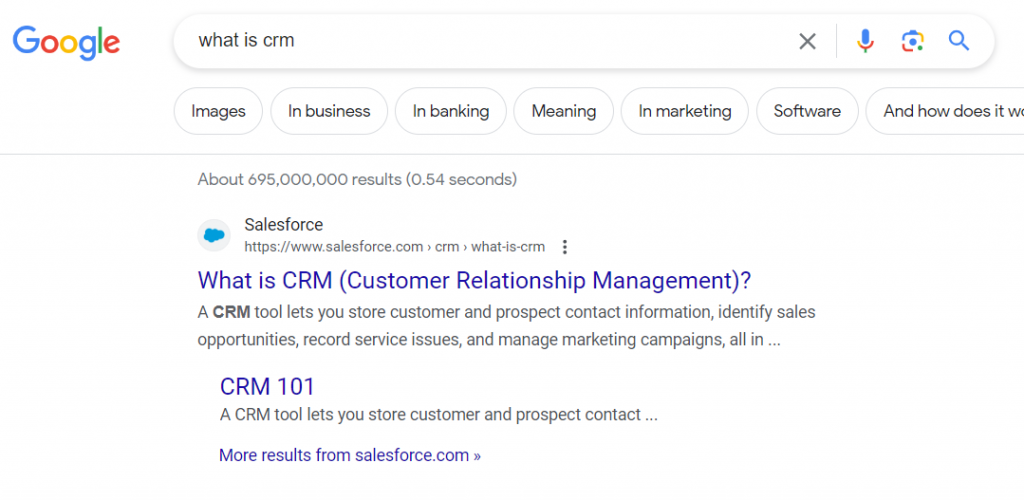
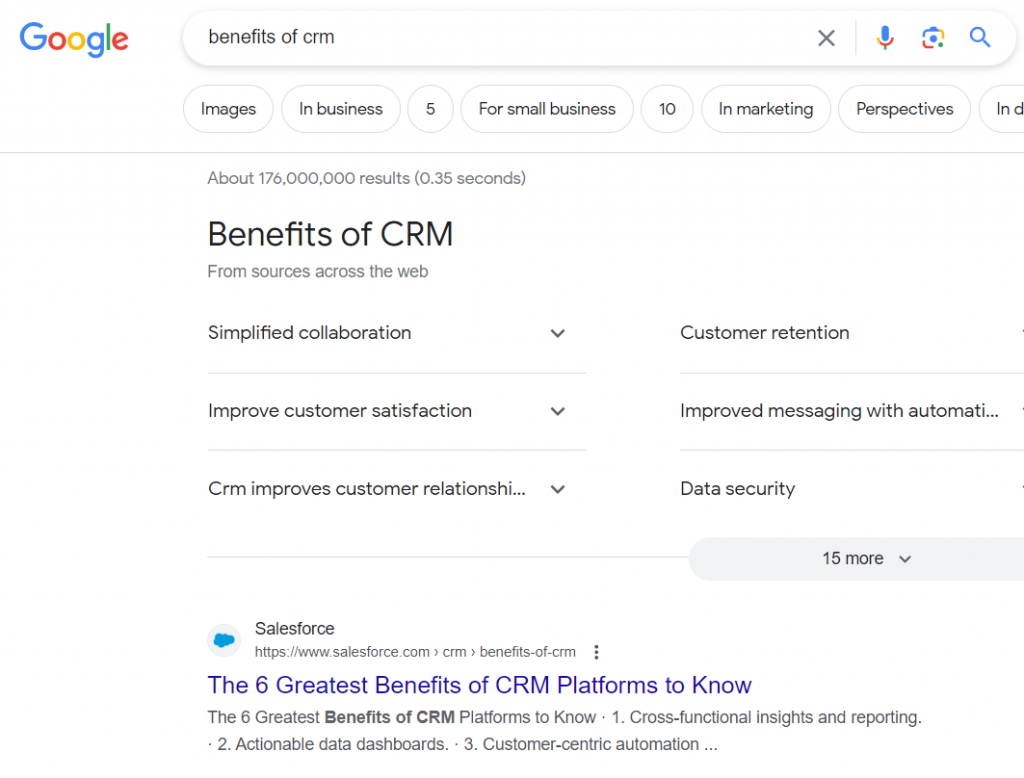
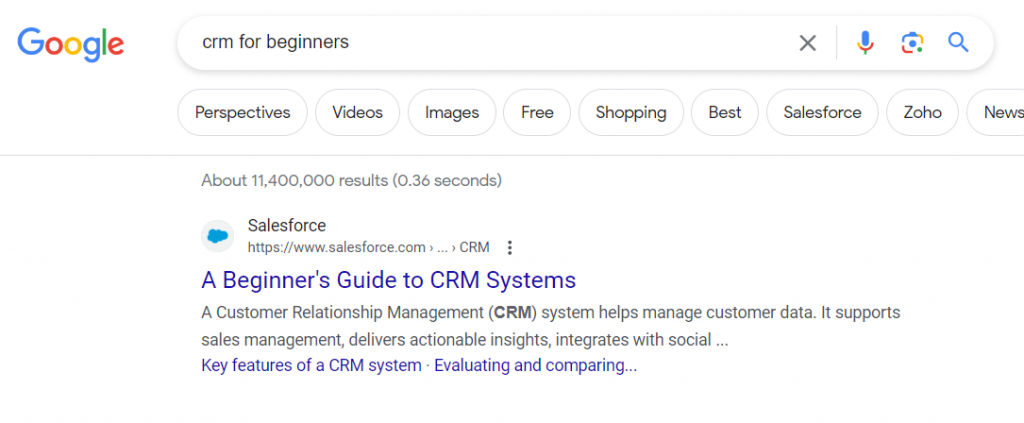
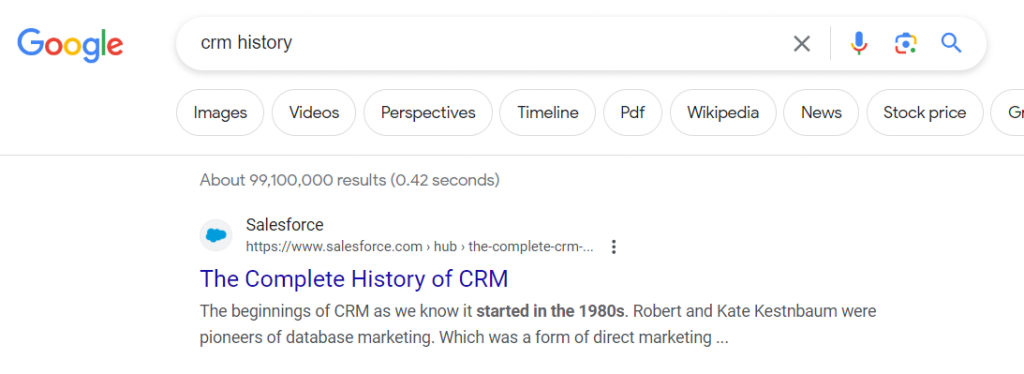
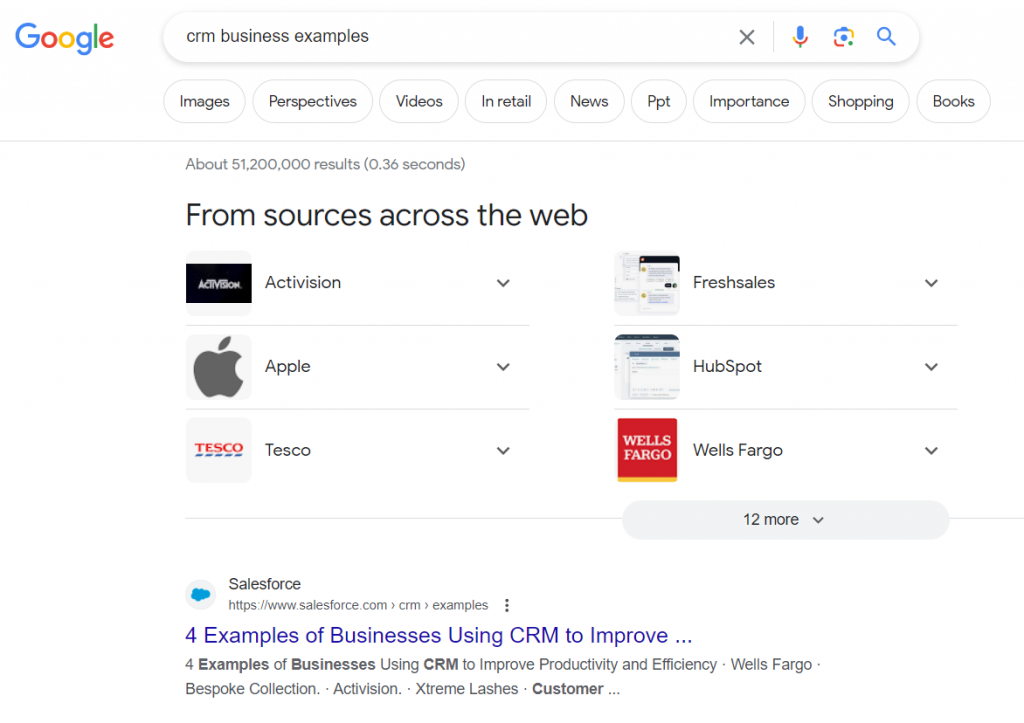
As a potential customer, the chances are you’d instinctively develop trust for Salesforce and inquire to learn more about their product. This can be the stand-out-from-the-crowd difference that comes with topical authority. Your SaaS brand will organically be where your customers are exploring.
Building Topical Authority for SaaS: Step-by-Step Guide
Now that you have a grasp of the importance of topical authority relating to both search engines and consumer behavior, let’s dive into how exactly your SaaS brand can establish topical authority for a specific subject.
Identify Core Topics
Start by zeroing in on the core topics that resonate most with your target audience and are intrinsic to your SaaS product. These topics should not only reflect your product’s strengths but also address your audience’s pain points and questions.
You can do this by brainstorming with a free tool like ChatGPT or Semrush (among other SEO tools). For instance, a helpful ChatGPT prompt could look like this:
“My website focuses on [Your Niche], and I’m aiming to establish topical authority in this area. My target audience primarily consists of [Describe Audience], and they are interested in [Topics of Interest]. They face challenges such as [List Challenges]. Based on this, could you suggest a range of detailed content topics that would help build my website’s topical authority, addressing the needs and interests of my audience while covering the core aspects of [Your Niche]? Please include a mix of foundational overviews, deep dives into specific subtopics, practical guides, and any emerging trends or technologies relevant to the niche.”
From there, you can get several relevant ideas that could be worth creating pages for.
Create a Content Silo Structure
Once you’ve pinpointed your core topics, organize your content into silos. Think of each silo as a pillar that supports a broader topic, with branches extending into more detailed subtopics. This method not only helps in organizing content logically but also enhances your website’s SEO by clearly defining topic areas that make it easier for Google to index your content.
Create Content
Now that your silos are in place, the next step is to write. Craft detailed, insightful pieces that thoroughly cover each subtopic. Your content should inform, engage, and motivate readers to explore the topic further.
An important thing to keep in mind during the content creation process is that quality matters more than quantity. Many companies find it hard to write content while leading an organization, so don’t settle on quality. If your content isn’t helpful or unique, then search engines like Google won’t prioritize it. So, you diminish your chances of having it appear organically, and even if it does, your audience won’t engage with subpar content.
Internally Link
As discussed above, establishing internal links between all of your related content (often within one designated silo) boosts site navigation for visitors and identifies a relevant relationship to Google. As you create and publish content, take the time to proactively and intentionally link internally to the relevant pages.
Internal link pro-tip: Avoid over-optimizing internal links by having anchor text variety for specific links. For instance, if you have a blog titled “Learning Management System (LMS) Guide” don’t have multiple pages link to it with the anchor text “LMS Guide.” Instead, change it by using varying anchor text like “Your comprehensive LMS resource”, “A beginner’s guide to understanding LMS”, “In-depth LMS insights”, and so on.
Build External Links (aka Backlinks)
Now that all of your content is created and linked together, the final step is to build backlinks to your content. Backlinks will increase your domain’s authority as well as signal to Google that your content is high-quality.
Feel free to contact relevant, reputable websites to encourage them to link your topical authority content as a go-to resource within the industry. The best part about backlinks is that once you have a few and your content ranks better, then other websites naturally link more to you once you increase brand visibility.
Final Thoughts
Focusing on search engine optimization is arguably the best marketing strategy for your SaaS company this year. In the landscape of business management, you only have so many realistic choices to implement successful marketing. No other strategy meets your target audience right where they’re searching for your product and in an authentic, reputable way (as opposed to search ads) like SEO.
Now as Google and customer behavior evolve, topical authority is hands-down the best SEO strategy. It signals to Google that you have experience, expertise, authority, and trust within your niche, so Google has no choice but to recognize and reward your website. As a result, your audience takes notice and action.























Leave a comment!